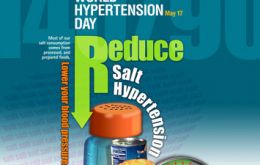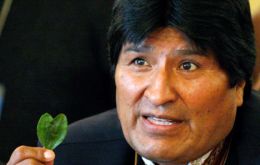MercoPress. South Atlantic News Agency
Tag: World Health Organization
-
Friday, May 17th 2013 - 17:49 UTC
World Hypertension Day: WHO says avoid processed, canned and ready-to-eat-foods

At least 30% of people in the Americas suffer from hypertension, or high blood pressure, for which excessive dietary salt is the main risk factor. For 1 of 3 people who have hypertension, cutting sodium intake can reduce their blood pressure to normal levels. Reducing dietary salt could also prevent an estimated 25% of heart attacks and strokes worldwide.
-
Monday, March 18th 2013 - 20:26 UTC
In 2010 there were 1.24 million road traffic related deaths worldwide, says WHO report

Only 28 countries, covering 7% of the world’s population, have comprehensive road safety laws on all five key risk factors: drinking and driving, speeding, and failing to use motorcycle helmets, seat-belts, and child restraints.
-
Thursday, February 14th 2013 - 21:00 UTC
Beijing's pollution alarms neighbours

The good news for the Chinese leadership is that their fiscal policies have paid off, producing both the world's second largest economy and the globe's leading creditor nation in less than a generation.
-
Monday, January 14th 2013 - 06:38 UTC
Major victory for President Morales: UN accepts “coca leaf chewing” in Bolivia

Bolivia will again belong to the 1961 Single Convention on Narcotic Drugs after its bid to rejoin with a reservation that it does not accept the treaty’s requirement that “coca leaf chewing must be banned” was successful Friday. Opponents needed one-third of the 184 signatory countries to object, but fell far, far short despite objections by the US and the International Narcotics Control Board.
-
Wednesday, December 5th 2012 - 18:32 UTC
WHO sponsored research helps identify heavy lead contaminated areas in Peru

Countries – especially those with a long mining history -- can substantially reduce lead poisoning in children by mapping contamination levels in the soil to identify high-risk areas and by taking measures to keep children away from those areas, according to a study published this month in the public health journal, the Bulletin of the World Health Organization.
-
Tuesday, October 30th 2012 - 07:25 UTC
‘Atlas of Health and Climate’ to understand the challenges of extreme conditions

As the world’s climate continues to change, hazards to human health are increasing. The Atlas of Health and Climate, published jointly by the World Health Organization (WHO) and the World Meteorological Organization (WMO), illustrates some of the most pressing current and emerging challenges.
-
Wednesday, September 26th 2012 - 07:13 UTC
Following two cases, World Health Organization instructs on novel coronavirus

The World Health Organization, WHO, announced on Tuesday that no additional cases of acute respiratory syndrome with renal failure due to infection with a novel coronavirus have been reported.
-
Thursday, September 6th 2012 - 03:51 UTC
Brazil excels in many fields but also in crack and cocaine consumption

Brazil is the world's largest market for crack and the second for overall cocaine use, researchers from the Federal University of Sao Paulo (UNIFESP) said on Wednesday.
-
Wednesday, August 15th 2012 - 23:40 UTC
World Health Organization praises Australia’s high court ruling on cigarette packaging

The World Health Organization (WHO) said on Wednesday it strongly welcomes the landmark decision from Australia’s High Court to dismiss a legal challenge from the tobacco industry, and calls on the rest of the world to follow Australia’s tough stance on tobacco marketing.
-
Wednesday, July 4th 2012 - 18:42 UTC
New UN food standards regulations extensive to milk, sea food, dried fruit and melons

The UN food standards body has agreed on new regulations, including the maximum level of melamine in liquid milk formula for babies, to protect the health of consumers across the world. Other measures adopted include new food safety standards on seafood, melons, dried figs and food labelling.
